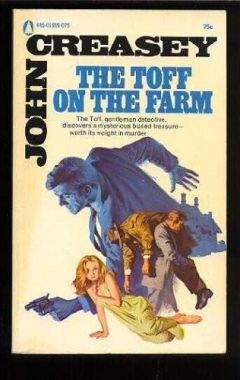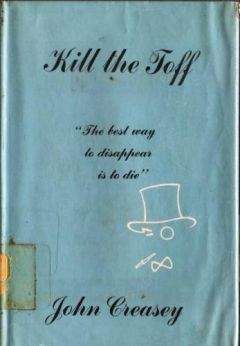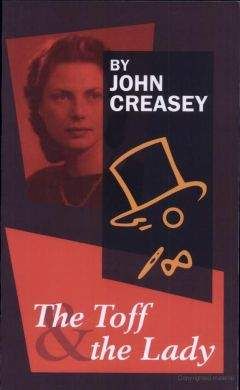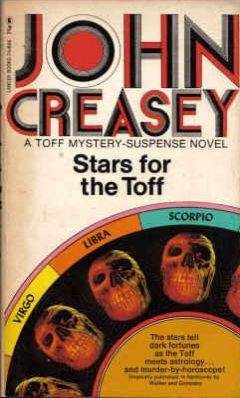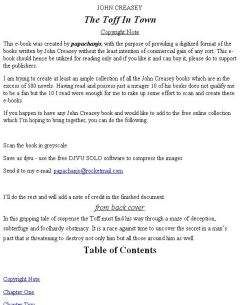John Creasey - The Toff And The Curate
На электронном книжном портале my-library.info можно читать бесплатно книги онлайн без регистрации, в том числе John Creasey - The Toff And The Curate. Жанр: Прочее издательство неизвестно, год 2004. В онлайн доступе вы получите полную версию книги с кратким содержанием для ознакомления, сможете читать аннотацию к книге (предисловие), увидеть рецензии тех, кто произведение уже прочитал и их экспертное мнение о прочитанном.
Кроме того, в библиотеке онлайн my-library.info вы найдете много новинок, которые заслуживают вашего внимания.
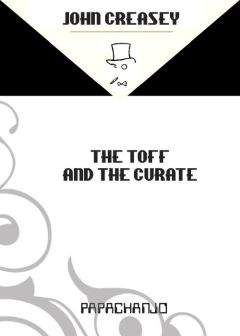
John Creasey - The Toff And The Curate краткое содержание
The Toff And The Curate читать онлайн бесплатно
The Conference lingered on until late afternoon. By then, correspondence had accumulated and it was nearly half-past six before Rollison saw his ATS clerk seal the last letter.
“Is there anything else, sir?” she asked.
“Yes,” said Rollison. “Do you ever go to West End nightclubs?”
“Why, yes—occasionally, sir!”
“What’s the whisky like?”
“You shouldn’t touch it,” she said, confidentially, it’s enough to put you out on your feet!”
“How do they sell it?” asked Rollison. “I mean, could you go and buy me a bottle— tonight, say?”
“I suppose I could,” she said, looking at him suspiciously, for he spoke as if obtaining a bottle of whisky would be a great adventure. And then a false light dawned upon her. “If you really want some whisky, sir, a friend of mine is in the trade and I could get you some.”
“That’s sweet of you,” said Rollison, smiling. “But I haven’t gone mad. I want a bottle of the stuff I would buy at a nightclub but I don’t want to buy it myself.”
Then the true light dawned and she hugged herself as she went off, having sworn that she would not confide in a soul.
Rollison telephoned Jolly, to learn that he had not been able to find Gregson again but that the police were having one of their periodic comb-outs of the East End, that many people were already in hiding and the Fighting Parson was no longer the ruling topic.
“That’s better,” said Rollison. “He doesn’t want the limelight. I’ll go to see Cobbett the crane-driver, I think.”
“Very good, sir,” said Jolly.
Rollison had purposely kept from the crane-driver and not asked anyone else to watch him, believing it would be better if Cobbett lived in a fool’s paradise for a few hours. The time had come for the direct approach. But he was not able to go immediately for, as he left Whitehall, a stolid detective-sergeant in plainclothes approached and asked politely if he would mind stepping along to Scotland Yard.
About the time that Rollison was walking towards Scotland Yard with the amiable sergeant, Joe Craik was putting up the black-out shutters at his shop. After every one, he stopped and rubbed his hands, sniffed and smiled his quivering, rabbit smile. He was not furtive, yet gave the impression that he was afraid that people were pointing him out and talking about him.
When he had nearly finished, a youthful figure appeared in front of the shop. Craik turned and looked into the narrowed eyes of Cobbett the crane-driver.
“Now, what do you want?” demanded Craik, sharply.
Cobbett sniffed. Two or three people including a monstrously fat woman were walking by the shop and heard the opening remarks. The woman stayed within earshot.
“Have you heard about the accident?” demanded Cobbett.
“Yes, you fool! You might have—”
“Doan rub it in,” pleaded Cobbett and if he were acting he was doing so very well. “Wot ought I to do, Mr Craik? I never meant it.” Craik rubbed his hands and then said: “Well, my boy, if you’re really sorry, then I won’t make it any the worse for you. I know what you can do—go along to Mr Kemp, the curate, and tell him how sorry you are.”
“Do you think—” Cobbett began. “He won’t refuse to forgive you, my boy,” said Craik. “You run along.”
Cobbett still looked miserable but nodded and obeyed.
The fat woman wearing a coloured shawl and a tattered skirt, the hem of which dragged along the pavement, had heard every word. She moved on with a great effort when Craik finished his task, sniffing and saying in an audible voice:
“If I’d have moved off soon’s the boy “ad stopped, he would’a said I was listening to ‘im, that ‘e would!” Her fleshy face was set in lines of disgust. She waddled as far as Little Lane, turned into it and eventually reached Number 49. Outside, two of Bill Ebbutt’s men called out good-humouredly: “What’s the latest, Ma?” She tossed her head at them and was admitted to the Whitings’ home by one of the children who called her Mrs Parsons. Then, she regaled the old woman at the house with everything she had heard.
Mrs Parsons was, beyond all doubt, the district’s most notorious gossip. Some said there was no malice in her and that she could no more keep information to herself than a colander could hold water. The fact that she talked, and that no confidence was safe with her, was extremely well known—as was the fact that she had one particular crony, Mrs Whiting’s mother.
She was not a stranger to Rollison, of whom she always spoke in hushed tones as “The Torf and before whom she always curtseyed, but he had not been to see her often recently for he had come to the conclusion that she developed trivial incidents so colourfully and plausibly that they became entirely different from the original.
Soon, she was on her way again and immediately afterwards Mrs Whiting’s mother came hurrying out. So two tongues started wagging. Before long, the whole district knew that Cobbett was going to see the curate and wondered why. The story of the accident was already well-known and one of the characteristics of the East End was that when anything happened to the Toff, it had no chance of being passed over; it became an item of general interest.
Rollison, unaware of the significance in the talk, walked along with the sergeant towards Scotland Yard.
CHAPTER FIFTEEN
The Return Of The Holiday-Maker
Rollison was not greatly perturbed as he walked into the familiar hall of Scotland Yard, although a telephoned request would have been more normal. The fact that a sergeant had been waiting outside one entrance of the building suggested that the others had been watched, and that the Yard had been determined to see him quickly.
On the way, he had talked about the weather.
At the Yard, he asked who wanted to see him.
“Superintendent Grice, sir,” said the sergeant.
Rollison was pleasantly surprised for not only did he know Grice well but he was sure that Grice would be helpful whenever he could be. So he entered the spacious office with a smile, as Grice rose from his chair. The Superintendent was a tall, spare man whose complexion was normally very like a woman’s and whose skin was stretched tight across his face, particularly at his nose, thus emphasising its high bridge. Grice’s complexion and his large brown eyes—not unlike ‘Keller’s’—were his most noticeable features but Rollison was amazed when he saw him.
“Well, well!” he exclaimed. “The holiday-maker returned—slightly sunburned!”
Grice, his face bright red with sunburn, managed a painful grin.
“Don’t rub it in,” he said. “It’s as stiff as blazes.”
“The policeman who never grew up!” Rollison sat down and stretched out his long legs. “What’s brought you back early?”
“You,” said Grice.
“Not I—distrustful policemen elsewhere, I’m afraid.”
“Judging from a “phone call I’ve had from Chumley, he’s more than distrustful—he’s highly suspicious! You needn’t tell me that he should know better. You should have treated Chumley more leniently, Rolly.”
“He is rather fond of throwing his weight about and—”
“You could have satisfied him without getting his back up,” remonstrated Grice.
“I rather wanted his back up,” murmured Rollison.
“I expected as much,” commented Grice. “Well, where will you start?”
“I don’t start,” said Rollison, “I was badgered into coming here by a police sergeant whose expression proved that he knew he was doing the wrong thing. Whose idea was that?”
“Mine. One of Chumley’s men was here and I made him see I really meant business.”
“Good!” said Rollison. “What business? Whisky?”
“Now you’re getting interesting,” said Grice. “What do you know about the whisky-running?”
“Very little,” answered Rollison, cautiously. “I didn’t believe Gregson when he told me that he was stealing a few cases and passing them on at a profit. I think it goes deeper. Does it?”
“Now you’re asking,” Grice said.
Rollison took out his cigarette-case and lit a cigarette—Grice rarely smoked—and carefully replaced the case. After that, he contemplated Grice in silence for some minutes before saying, quietly:
“You and I needn’t beat about the bush, need we?”
“What really took you to Whitechapel in the first place?” asked Grice.
“Kemp! Just Kemp! Nothing but Kemp! He was getting a raw deal and he’s still in danger, perhaps deadlier than before. So I’m still interested.” Rollison spoke quietly but emphatically. “I think he’s stumbled across a whisky-racket but I know nothing beyond that and I’m not going to theorise for Chumley, you, or the AC himself. The truth is,” went on Rollison, warming up, “that as soon as the word ‘whisky’ was mentioned Chumley pricked up his ears and, before I could turn round, you’d cut short your holiday. Presumably, you were working on it before, decided you could take a holiday but came haring back as soon as you knew that trouble had broken out about it.”
Grice’s manner relaxed.
“You’re pretty well on the mark, Rolly. But the thing I find it hard to believe and which Chumley refuses to accept is that you went down to Whitechapel on Kemp’s behalf alone. Was it partly because you’d been working on the case elsewhere and found a lead.”
“It was not. Where do you imagine I would have started?”
“I wouldn’t try to guess,” said Grice.
“This last day or two I’ve guessed that there is a lot of hooch being distributed throughout the West End,” said Rollison. “Is there?”
Grice leaned forward and spoke with unexpected warmth.
“There is, and it’s not ordinary hooch. Much of it is poison. We’ve had complaints from our own service authorities, from the Americans and from several of the Allied Governments— officers and men in London on leave have drunk the stuff and made themselves ill. There have been two fatalities due to acute alcoholic poisoning. The deaths were directly attributable to the whisky. Do you mean to tell me that you didn’t know?”
“Of course. I wouldn’t have been working overtime if I had. Do you mind if I use your telephone?” Grice looked puzzled but shook his head and Rollison put a call through to his office. In a few seconds, a weary Bimbleton answered him.
“Bimble, old chap,” said Rollison, “have you heard about complaints in high places of some of our chaps suffering severely from drinking bad whisky in the West End?”
“Yeh,” said Bimbleton and then articulated more clearly:
“Why, yes, Rollison. I’m sorry. I was just eating a sandwich.”
“Who is handling it?” asked Rollison. “The drink, not the sandwich.”
“Cracknell,” Bimbleton said.
“Is he on duty, do you know?”
“No, he’s left I think—no, wait a minute! [ saw him coming in half an hour ago.”
“Put me through to him, will you?” asked Rollison and sat back, beaming at Grice, who looked a little less mystified. Soon, a crisp voice sounded in Rollison’s ear and Rollison introduced himself with some circumspection.
“Yes, Rollison,” said Cracknell, who carried much weight at Whitehall. “. . . What’s that? . . . Yes, it is quite true . . . Are you sure?”
“I’m quite sure, sir,” Rollison assured him. “I think, with a little luck, we could see the end of it inside a week. The difficulty is that I’m so tied to the office.”
“This isn’t some pet scheme of your own for which you want leave, is it?” demanded Cracknell, suspiciously.
“I’m in the office of Superintendent Grice, of Scotland Yard,” Rollison told him. “He asked me to see him about this very business.”
“I’ll do what I can to arrange for you to be assigned to it,” Cracknell promised.
“Thanks very much,” said the Toff, warmly. “I take it that it is regarded seriously?”
“Extremely so,” said Cracknell but there was an echo of laughter in his voice. “Why do you ask?”
“If it’s a matter of urgency, I shouldn’t waste any time,” said Rollison.
“You can consider yourself assigned to it,” said Cracknell and rang off; the last Rollison heard from him was the beginning of an explosive laugh.
As Rollison replaced the receiver, Grice said: “One day, you’ll wheedle yourself into active service again, I can see it coming. Then what will we poor flatfoots do at Scotland Yard?”
“Wheedle me back!” replied Rollison. “Grice, you couldn’t have done me a better service and Jolly will probably send you a congratulatory telegram! I am now working on this job in an official capacity and, while I am fully prepared to co-operate with the police, I must reserve the right to act as I think best in the interests of men and women of the services who, in their all-too-brief spells of leave, are being raddled with a fire-water sold under the name of whisky, and—”
“That’s enough!” cried Grice. “Well, exactly how much do you know?”
Rollison passed on the whole story. Grice made notes on a pad and, when Rollison had finished, they eyed each other thoughtfully. It was Grice who broke the silence.
“Do you think it would be wrong to try to force the case in Whitechapel just yet?”
“Yes. Don’t you?”
“Probably,” admitted Grice, “although it can’t be left too long. We’ll have to get Gregson and the man who calls himself ‘Keller’ as soon as we can. Chumley has descriptions of them and is already hard at work.”
“I doubt whether he’ll get them,” said Rollison. “My worry is—where is it distributed from in the West End? Have you found any store-places at all?”
“One or two small ones,” said Grice. “It doesn’t appear to be delivered in large quantities, only a few dozen at a time. We’ve found seven or eight retail suppliers. All of them swear that they buy it legally and believe that it is ordinary stuff—the story is so circumstantial in every case that it seems as if the organisers use a formula.”
“They’re not associated clubs, are they?”
“No, they’re all quite independent.”
“Then if they use a formula, it’s one which they’re told to use by the suppliers,” said Rollison. “What’s the story? The bottles of bad stuff were found among deliveries from the reputable companies.”
“Yes?”
“And the reputable companies know nothing about it, of course,” went on Rollison. “How long has it been worrying you?”
“For the better part of six months.”
“It all seems to have started about six months ago,” admitted Rollison, looking very thoughtful. “You remember that I told you that Irish dock-workers were concerned?”
“Yes. I’ll look into that angle.”
“Not a bad idea,” said Rollison. “Well, we’re making progress of a kind. The main trouble is that I’ve started working from the wrong angle. They may distribute it in small quantities but there appears to be a lot of it about. Given much thought to distribution?”
“Yes,” said Grice.
He did not enlarge and so gave Rollison the impression that he was holding something back. Rollison did not attempt to force any information but went on thoughtfully:
Похожие книги на "The Toff And The Curate", John Creasey
John Creasey читать все книги автора по порядку
John Creasey - все книги автора в одном месте читать по порядку полные версии на сайте онлайн библиотеки My-Library.Info.
